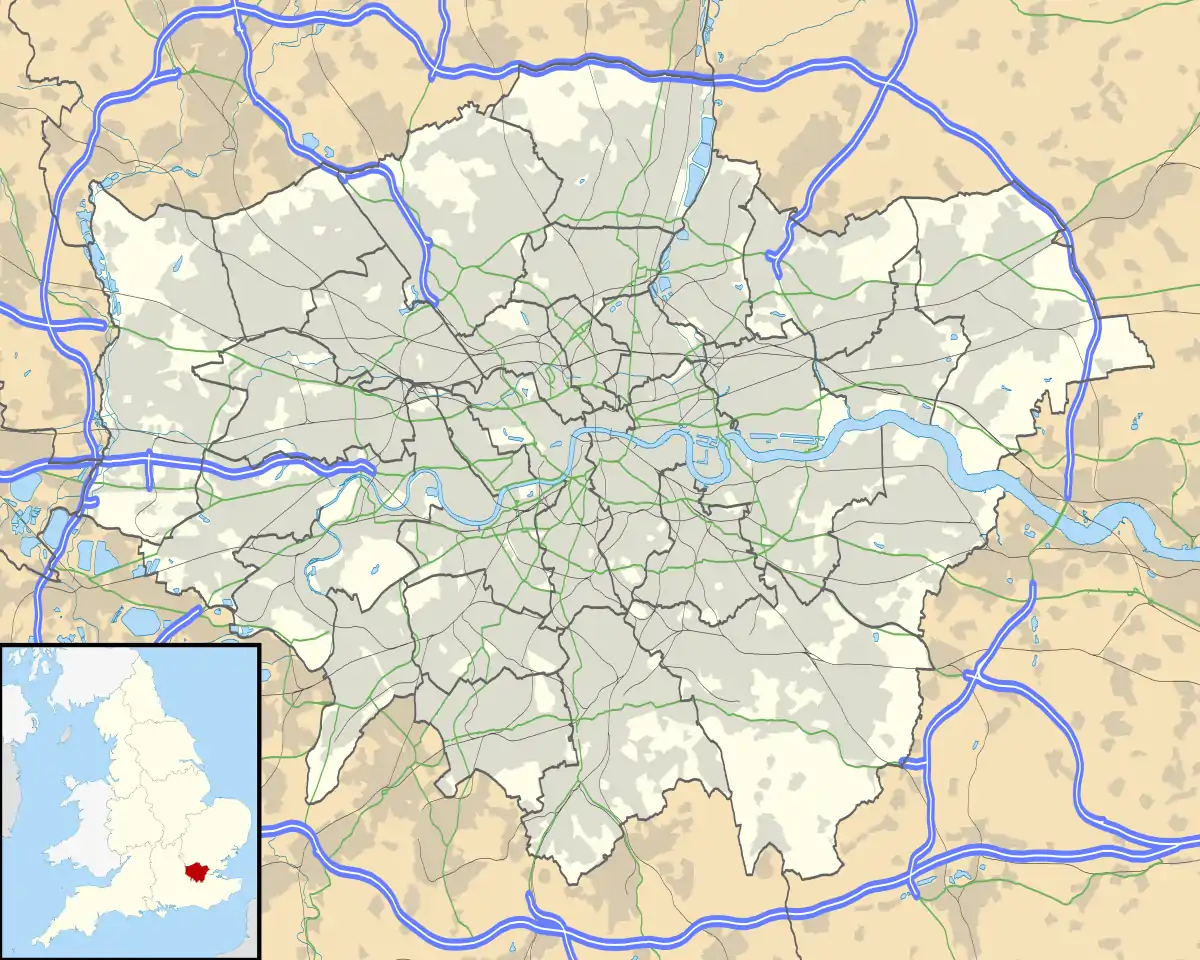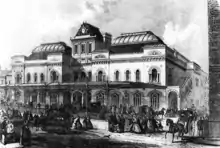Coombe Road railway station
Coombe Road was a railway station on the Woodside and South Croydon Joint Railway in London. When it was closed it was owned and managed by British Rail.
| Coombe Road | |
|---|---|
.jpg.webp) Map showing the station's location | |
 Coombe Road Location of Coombe Road in Greater London | |
| Local authority | London Borough of Croydon |
| Number of platforms | 2 |
| Railway companies | |
| Original company | Woodside and South Croydon Joint Railway |
| Post-grouping | Southern Railway British Rail |
| Key dates | |
| 10 August 1885 | Opened as Coombe Lane |
| 1 January 1917 | closed |
| 30 September 1935 | Reopened, rebuilt and renamed |
| 16 May 1983 | Closed |
| Other information | |
| WGS84 | 51.364879°N 0.083608°W |
History
A 2-mile-29-chain (3.8 km) link between the Mid-Kent Line at Woodside and the Oxted Line at Selsdon known as the Woodside and South Croydon Joint Railway was authorised in 1880.[1] Opened on 10 August 1885, it was jointly worked by the London, Brighton and South Coast Railway and the South Eastern Railway.[1][2][3] with the only intermediate station at Coombe Lane.
As part of a scheme to increase patronage using Kitson steam railmotors designed by Wainwright,[4][5] a railway halt was provided on the south side of Bingham Road in Addiscombe on 1 September 1906.[6][7][8][9] Spencer Road Halt, also on the Woodside and South Croydon line, was opened on the same day,[10][11][12][13] part of four such halts in the London area; the others being Bandon Halt and Beeches Halt.[14][15] Despite new construction along the route of the line, passenger loadings were light and working expenses generally exceeded farebox revenue.[16][2] The line was a candidate for wartime economies during the First World War and the halts at Bingham Road and Spencer Road were closed on 14 March 1915 upon which the railmotor service ceased, with full closure of the line following on 31 December 1916.[16][6][17][18][8] The line was reopened and electrified by the Southern Railway on 30 September 1935.[19][18][8] The former Coombe Lane station was completely rebuilt and given the name Coombe Road. Electrification was not a success and by 1949, 1959[20] the service was reduced to a peak-hours 2-car half-hourly shuttle from Elmers End.[19][21][22] The station's platforms were nevertheless extended as part of a mid-1950s scheme to allow it to accommodate 10-car trains.[22] Full closure was proposed in the Beeching Report but a reprieve was granted on the basis that some hardship would be caused.[23][24] The line continued to be unprofitable and from 10 July 1967, Bingham Road and Coombe Road were only served between 07:52 to 09:50 and 16:17 to 19:10 on weekdays.[23][25] All through London services ceased in April 1976 leaving 2EPB 2-car sets to provide a shuttle service between Elmers End and Selsdon or Sanderstead.[23][25] The inevitable closure of the line came in 1983, with the last train departing at 19:30 from Sanderstead on Friday 13 May and official closure following on 16 May.[23][26][25][27][8]
Present day
The track was lifted and the station buildings were demolished within one year after closure. Tramlink services reusing the railway alignment at Coombe Road commenced on 10 May 2000. A tramstop (Lloyd Park tram stop) was constructed 200 metres to the east of the former station to serve the same area.
| Preceding station | Disused railways | Following station | ||
|---|---|---|---|---|
| Bingham Road | British Rail Southern Region Woodside and South Croydon Railway |
Spencer Road halt |
References
| Wikimedia Commons has media related to Coombe Road railway station. |
Notes
- Jackson (1999), p. 52.
- White (1987), p. 56.
- Skinner (1985), p. 19.
- Turner (1979), pp. 162-163.
- Jackson (1999), p. 53.
- Butt (1995), p. 34.
- Kidner (1985), p. 40.
- Quick (2009), p. 84.
- Mitchell & Smith (1995), map above fig. 7.
- Butt (1995), p. 217.
- Turner (1979), p. 163.
- Kidner (1985), p. 56.
- Quick (2009), p. 361.
- Turner (1979), p. 164.
- Skinner (1985), p. 23.
- Jackson (1999), p. 54.
- Skinner (1985), p. 25.
- Clinker (1988), note 2129.
- White (1987), p. 72.
- Londond Disused Stations Volume 4 page 34 by J.E.Connor
- Jackson (1999), pp. 54-55.
- Connor (2003), p. 13.
- Jackson (1999), p. 55.
- Skinner (1985), p. 35.
- Connor (2003), p. 15.
- Skinner (1985), p. 37.
- Mitchell & Smith (1995), fig. 8.
Sources
- Butt, R. V. J. (1995). The Directory of Railway Stations: details every public and private passenger station, halt, platform and stopping place, past and present (1st ed.). Sparkford: Patrick Stephens Ltd. ISBN 978-1-85260-508-7. OCLC 60251199.
- Clinker, C.R. (1988) [1978]. Clinker's Register of Closed Passenger Stations and Goods Depots in England, Scotland and Wales 1830–1980 (2nd ed.). Bristol: Avon-Anglia Publications & Services. ISBN 978-0-905466-91-0. OCLC 655703233.
- Connor, J.E. (2003). The South Eastern Railway. London's Disused Stations. 4. Colchester: Connor & Butler. ISBN 0-9476-9937-6.
- Jackson, Alan A. (1999) [1978]. London's Local Railways. Harrow Weald: Capital Transport. ISBN 1-8541-4209-7.
- Kidner, R.W. (1985). Southern Railway Halts; Survey and Gazetteer. Headington: Oakwood Press. ISBN 0-8536-1321-4.
- Quick, Michael (2009) [2001]. Railway passenger stations in Great Britain: a chronology (4th ed.). Oxford: Railway and Canal Historical Society. ISBN 978-0-901461-57-5. OCLC 612226077.
- Mitchell, Vic; Smith, Keith (March 1995). Croydon (Woodside) to East Grinstead. Country Railway Routes. Midhurst: Middleton Press. ISBN 1-873793-48-0.
- Skinner, M.W.G. (December 1985). Croydon's Railways. Southampton: Kingfisher Railway Productions. ISBN 0-9461-8414-3.
- Turner, John Howard (1979). The London, Brighton & South Coast Railway: Completion & Maturity. 3. London: B.T. Batsford. ISBN 0-7134-1389-1.
- White, H.P. (1987) [1963]. Greater London. A Regional History of the Railways of Great Britain. 3. Newton Abbot: David & Charles. ISBN 0-946537-39-9.
